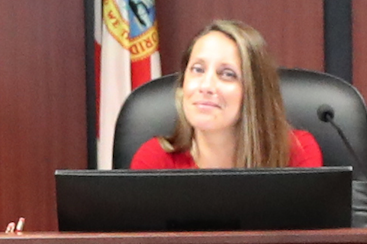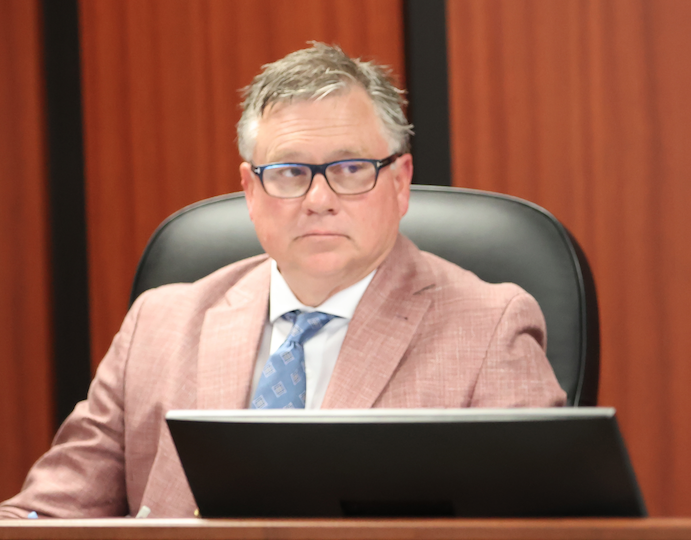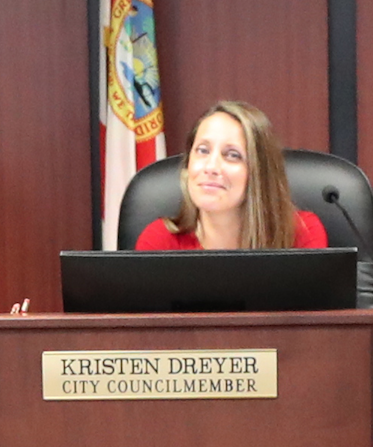Remodel of Employee Health Center approved: Dreyer, Mansfield dissent on choice of contractor


Councilman Barry Mansfield is seen here in this file photo from Dec. 7. [OG/Bruce Ackerman]
The goal of the expansion and remodel, as presented by John King, director of Fleet & Facilities Management, is to provide access to affordable, high-quality health care services for its approximate 1,950 eligible employees, retirees and dependents currently enrolled in the city’s health insurance plan.
At this time, King said that the health center regularly operates at or near full capacity, which limits how many providers can be scheduled at any one time. The project will provide additional exam rooms, a redesigned reception lobby, medical workstations and additional restrooms.
The vote passed 3-2 last Tuesday, with Councilwoman Kristen Dreyer and Councilman Barry Mansfield dissenting due to misgivings on the choice of contractor.
“The red flag for me was the significantly lower bid price that this contractor had,” said Dreyer. “The scope is so detailed that I think our bids should have been a little closer in price.”
On Sept. 7, the city issued an invitation to bid on the expansion and remodel project. A total of five bids were received. After a cost-benefit analysis, MIE, Inc., based out of Apopka, was found to be the most competitive bid at $264,482.
Other bids included Advanced Commercial Contractors, Inc., based out of Eustis ($299,644); Baker Construction and Management, LLC ($309,000); Blackwater Construction Services, LLC ($345,978); and Foundation Services of Central Florida, Inc. ($364,500). The latter three bids were all companies based out of Ocala.
“I have some concerns with this contractor being an Orlando metro-based contractor, who we’ve never done business with before, coming in incredibly low,” Dreyer said. “We had three Ocala-based contractors bid on this who lost out. I’ve researched the resume of [MIE, Inc.]. I’ve pulled up some of the permits that they’ve had and read the inspections—and I’m still not convinced.
“I’m in complete favor of this project,” she added. “It’s a no-brainer. But I’m a no on this contractor.”
City Attorney Robert Batsel Jr. mentioned that a city ordinance existed requiring the threshold for local vendor bids to be narrow. So, according to Batsel, the city doesn’t overpay for services to benefit a local vendor.
“I understand that there is both sides [to this issue] and there’s a balance,” said Batsel, “but that threshold is very low. It’s within 5% I believe. And if our local vendor comes in within 5% and the non-local vendor is the low bidder, we can’t award it to a local vendor.”
Contracting Officer Tiffany Kimball took the podium next to clarify some points that Councilman Mansfield brought up regarding scope and the responsibility each bidder has to meet the requirements of the job it’s bidding for and not overcharge the city after bidding so low to win a contract.
“In all cases,” Kimball said, “even if it’s not a bonded job, my buyers go through all the requirements of the bid and ensure that they’re qualified per the bid. If not, they’re rejected and we do not accept the bid. But if there are unbalanced bids, that’s my decision. I discuss it with the bidder. And, it’s also my decision to reject them.”

Councilwoman Kristen Dreyer is seen here in a file photo from Dec. 7. [OG/Bruce Ackerman]
“Well, it is my job to make sure that a bid is responsible and responsive,” she answered. “And, if they’re unbalanced, it is my job to pick up the phone and talk to the bidder and tell them, ‘Per this bid, I feel that there is no way you can do this bid for this price.’
“If there are some reasons that they can give me that I hadn’t considered,” Kimball continued, “then that’s fine. But I’m not going to accept a bid that clearly the bidder didn’t know what the scope was.”
Kimball further explained that she felt comfortable with MIE, Inc., after reviewing its resume, especially with it being a fully bonded company.
“I feel comfortable they’ll get the job to the finish line,” she said. “They have to. We will ensure that.”
Open Dialogue
The City of Ocala’s local vendor preference, by ordinance was last updated in 2017, said Kimball to the Gazette on Dec. 28. The ordinance provides if a local vendor’s bid price is within 5% of the low bid. The local vendor will be awarded the bid over the non-local if the local vendor agrees to contract with the city for 1% less than the low bid.
“In that way,” explained Kimball via email, “the citizens do not overpay for services or goods, and the local vendor still can win the bid.”
A recent analysis of bids, said Kimball, over the last four years, indicates that the City of Ocala awards a vast majority of bids to local vendors, even without the need to apply a preference.
“A better tool to support local vendors would be to set aside particular contracts designated only for local vendors,” suggested Kimball. “These are called set-aside contracts. During my work with the federal government as a contract specialist, my workload included set-aside contracts to support local machine shops.”
Kimball said she saw firsthand how these contracts rejuvenated an industry while still providing competition among a set of qualified vendors.
“Our City Council could direct the use of set aside contracts to support local vendors for certain procurements where local participation is robust and when these vendors are preferred for projects where our vested partners are desired for a successful outcome,” she said, adding that per Florida Statute 255.0992, “for public work projects valued at more than $1,000,000, local vendors preferences and set-aside contracts cannot be applied.
“I have always been an advocate for local vendors,” Kimball concluded, “and I welcome open dialogue with these businesses in the shared interest of our community’s economic health.”





